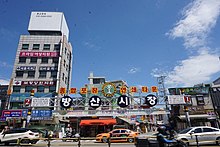Bangsan Market: Difference between revisions
No edit summary |
Seefooddiet (talk | contribs) →top: Formatting for Korea-related articles, replaced: (나의 국토 나의 산하) → ({{Korean|hangul=나의 국토 나의 산하|labels=no}}), the Joseon Dynasty → the Joseon period, Jung-gu, Seoul → Jung District, Seoul |
||
| (30 intermediate revisions by 20 users not shown) | |||
| Line 1: | Line 1: | ||
{{Short description|Traditional market in Seoul, South Korea}} |
|||
{{cleanup}} |
|||
{{Infobox Korean name |
|||
{{wikify}} |
|||
| img = |
|||
| caption = |
|||
| hangul = 방산시장 |
|||
| hanja = |
|||
| rr = Bangsan Sijang |
|||
| mr = Pangsan Sichang |
|||
}} |
|||
[[File:방산시장.jpg|thumb|right|alt=See caption|The market entrance]] |
|||
Bangsan Market is a traditional market located in Jugyo-dong Joong-gu, Seoul. Bangsan Market is famous for wrapping paper, press in Korea and there are more than 550 markets. These days, home baking is all the fashion in Korea because people can get ingredients and recipe on web site easily. Therefore, even many young people visit Bangsan Market on anniversary such as Valentine's Day or Pepero Day(11th Nov). |
|||
'''Bangsan Market''' ({{Korean|hangul=방산시장}}) is a traditional [[market (place)|market]] located in the [[Jugyo-dong]] neighborhood of [[Jung District, Seoul]], South Korea. The market is famous for its pressed [[wrapping paper]] and includes more than 550 stores. |
|||
The name, Bangsan actually comes from the former state of this place. Actually, this place was crowded with beggars from the Joseon dynasty so it was famous for bad smell but people started calling this place Bangsan included the letter "Bang" which means fragrant ironically.<ref><My Country, My Nature>(나의 국토 나의 산하),39p, Tae-soon Park</ref> |
|||
According to the Seoul Metropolitan Government, Bangsan Market is prepared as one of the tourist spots from 2011. Its plan is quite different from former modernization plan so we can feel natural traditional market. The Seoul Metropolitan Government expects that it would be great contributions for improving its local image. |
|||
The name of the market comes from the location's former condition during the [[Joseon Dynasty]]. At that time the area was not well maintained, and therefore became infamous for its bad smell. People began calling this place ''Bangsan'', ''bang'' being [[Korean language|Korean]] for ''fragrant''.<ref>Park, Tae-soon (2008). My Country, My Nature (나의 국토 나의 산하). p. 39.</ref> |
|||
To go to Bangsan Market, get on the Seoul subway line 2 and get off at Uljiro-4-ga station and go out through 4,5,6 gate. |
|||
According to the [[Seoul Metropolitan Government]], Bangsan Market has been designated a [[tourist destination]] since 2011. The government decided to keep the feel of a natural traditional market rather than modernize it.{{Citation needed|date=July 2013}} |
|||
==See also== |
|||
| ⚫ | |||
*[[List of markets in South Korea]] |
|||
*[[List of South Korean tourist attractions]] |
|||
==References== |
==References== |
||
{{reflist}} |
{{reflist}} |
||
{{Markets in South Korea}} |
|||
| ⚫ | |||
{{coord|37.5674|126.9996|type:landmark_region:KR|display=title}} |
|||
[[Category:Retail markets in Seoul]] |
|||
[[Category:Jung District, Seoul]] |
|||
{{SouthKorea-struct-stub}} |
|||
{{retail-market-stub}} |
|||
Latest revision as of 19:18, 12 October 2024
| Bangsan Market | |
| Hangul | 방산시장 |
|---|---|
| Revised Romanization | Bangsan Sijang |
| McCune–Reischauer | Pangsan Sichang |

Bangsan Market (Korean: 방산시장) is a traditional market located in the Jugyo-dong neighborhood of Jung District, Seoul, South Korea. The market is famous for its pressed wrapping paper and includes more than 550 stores.
The name of the market comes from the location's former condition during the Joseon Dynasty. At that time the area was not well maintained, and therefore became infamous for its bad smell. People began calling this place Bangsan, bang being Korean for fragrant.[1]
According to the Seoul Metropolitan Government, Bangsan Market has been designated a tourist destination since 2011. The government decided to keep the feel of a natural traditional market rather than modernize it.[citation needed]
See also
[edit]References
[edit]- ^ Park, Tae-soon (2008). My Country, My Nature (나의 국토 나의 산하). p. 39.
37°34′03″N 126°59′59″E / 37.5674°N 126.9996°E
